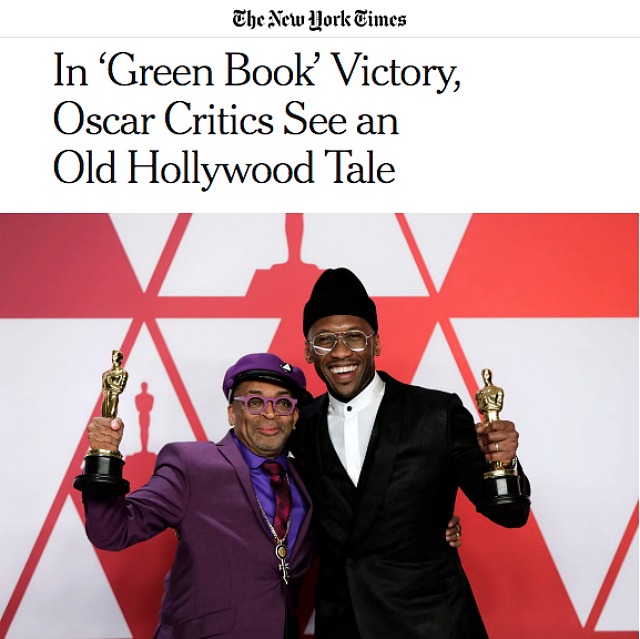Yesterday N.Y. Times Hollywood correspondent Brooks Barnes posted a piece that echoed what Barnes claimed is the general morning-after industry view about Green Book having won the Best Picture Oscar, that it was nothing less a social-political tragedy — a mortifying act that angered, outraged and depressed not just Spike Lee but everyone in town, including the mail-room guys.
I knew this was a bullshit take from the get-go, but Awards Daily‘s Sasha Stone put her objections into words faster than I. This morning Sasha forwarded a draft of a letter that she’d sent to the Times, and I suggested…I don’t know, three or four edits. Sasha gave me permission to post it here, but wants it understood that the use of certain explicit terms (“too white, vaguely racist”) was my idea, not hers. It’s a smart, well-reasoned response — please read:

“It’s disappointing that the Times did not offer more balanced coverage of Oscar night than what is contained in Brooks Barnes’ 2.25 article (“In Green Book, Oscar Critics See An Old Hollywood Tale“). It is misleading, on one hand, to point to a small but loud group of people protesting the film’s win but not, on the other, to report how popular Green Book was across the board.
“Two years ago, La La Land’s momentum was slowed because of politically correct protests online. (It was inauthentic, they claimed, for a white guy to be a jazz buff.) The Best Picture Oscar went to Moonlight. The following year, Three Billboards Outside Ebbing, Missouri was met with protests over its rural insular whiteness. It, too, was derailed — The Shape of Water won. This year Green Book was repeatedly assaulted for being old-fashioned, too white and even vaguely racist.
But this time the protests didn’t work. This may reflect an exhaustion with the hive mind continually pushing the red button of alarm.
“Green Book won the Toronto Audience Award in September, beating Roma, A Star is Born and every other film that played there. Green Book also defeated BlacKkKlansman, Black Panther, Roma, Bohemian Rhapsody and The Favourite at the Producers Guild of America Awards. It triumphed at the Golden Globes as well. If you ask me that show’s broad support counters your headline, and the narrative going forward.
“The fact is that for a film to win on a preferential ballot, as Green Book did at both the Producers Guild and the Oscars, it had to have broad support across all markers. That meant it could not have won with just ‘old white guys.’ Moreover, if ‘old white guys’ led that vote, how do you explain the unprecedented array of diversity and inclusion in the other categories?
“There were only three films in the running this year — Roma, Black Panther and Green Book, each of which won a major guild award. The likely truth is that Green Book prevailed on a preferential ballot partly due to the extreme protests against it, which most people outside the bubble of the internet thought were absurd.
“Green Book benefitted by not being a Netflix film. Roma was a foreign language film, and would have had to be the first in Academy history to win in both categories. That was the least likely scenario heading into the race.
“Green Book also benefitted from not being a Marvel film. Black Panther did not have any writing, directing or acting nominations. And BlacKkKlansman, remember, was not in competition for Best Picture, as it had not won a single major award heading into the race. It did not win the Writers Guild or the Screen Actors Guild or the Editors Guild or the Producers Guild.
“Some of those who cover the Oscar race seem to be misunderstanding the basics of how everything works. For Green Book to have won, it had to have gotten votes from every kind of voter — young, old, black, white, male, female. It simply could not have won otherwise. Please tell the truth about what really happened on Sunday night.”












